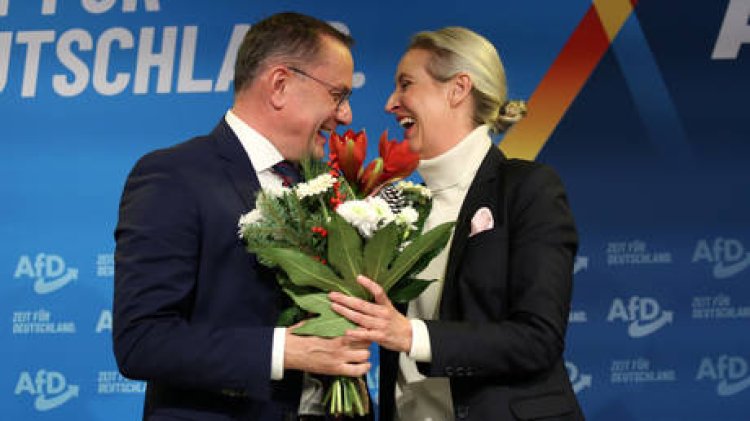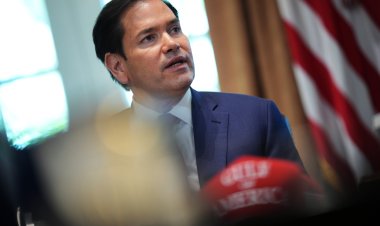Why the AfD Is Likely to Join the German Government
For the first time, the right-wing party has emerged as the frontrunner in a nationwide poll. It won’t be the last.

Germany is often unfairly characterized as lacking a sense of humor and being overly rational. In reality, it is a country full of contradictions.
When a regime in Kiev damages Germany’s essential energy infrastructure, Germans may respond with gratitude, providing financial and military support while searching for someone else to blame. Conversely, if Washington played a role in that destruction and proceeds to profit by selling liquefied natural gas at inflated prices, Germans become outraged—ironically, at China.
If you happen to lead the most popular and perfectly legal political party in Germany, brace yourself for exclusion from governance. The Alternative for Germany (AfD), despite its rising popularity, finds itself systematically locked out of forming governing coalitions.
This exclusion stems from the so-called “firewall,” a mechanism designed to prevent the prominent AfD from participating in governance. Notably, this practice lacks any constitutional or legal foundation. In fact, the “firewall,” by treating AfD voters' choices as less significant than those of other citizens, raises questions about its constitutionality in spirit, if not in letter. This scenario sharply contrasts with Germany's image as a nation that values order and rules.
Ultimately, the “firewall” represents a corrupt political agreement and a method of disenfranchisement: traditional parties, threatened by the ascendant AfD, have decided to ignore the will of voters. This strategy effectively renders AfD supporters as second-class citizens, especially affecting voters in the former East Germany and complicating narratives about national unity.
To clarify, the current polling indicating the AfD in the lead is only one survey; others still position it behind the mainstream conservative CDU/CSU bloc, led by soon-to-be chancellor Friedrich Merz. However, this variation is largely inconsequential. The key takeaway is the sustained upward trajectory of the AfD, a significant blow to Merz even before he officially takes office, as noted by international observers. This comes at a time when Merz's own polling numbers are notably declining.
Moreover, the “firewall” strategy appears to be failing significantly. Observers have long warned of this outcome, which is now becoming increasingly clear: the AfD's isolation only strengthens its position.
The CDU and SPD, Berlin's ruling parties, have recently completed negotiations on how to allocate government ministries, but their efforts are overshadowed by the AfD's breakthrough at a particularly inopportune moment. Their apparent security behind the “firewall” amplifies their unpopularity as voters express their dissatisfaction.
Widespread discontent exists among the German populace. Recent polls indicate that most Germans have little faith in possible changes under the new coalition of established parties. For instance, a February Ipsos survey reported that “as bad as never before” described the general mood, with only 17 percent believing the country is “on a good trajectory.” An overwhelming 83 percent felt that Germany was headed in the “wrong” direction. Such numbers reflect a deep-seated pessimism about the future under the same old leadership.
Despite these challenges, AfD leaders, like Alexander Gauland, remain optimistic about their prospects: “It’s a natural law that we’ll be ahead of the CDU at the next elections.” However, the AfD's current momentum could be jeopardized by potential internal conflicts or mismanagement, particularly concerning responses to economic pressures like U.S. tariff policies.
Meanwhile, traditional parties appear more focused on alienating both voters and their own membership. CDU members are expressing frustration over the party's spending policies, which they feel contradict their conservative values. In Sachsen-Anhalt, a local CDU branch has publicly criticized its leadership and demanded an end to the “firewall,” advocating for collaboration with the AfD instead.
While some may react with outrage at the idea of engaging with the far-right AfD, such concerns overlook the reality that both CDU/CSU and AfD share significant ideological common ground. In the not-so-distant future, it is plausible that the AfD could enter and possibly lead a German government. If that comes to pass, those who insisted on maintaining the flawed “firewall” will have only themselves to blame. The question is no longer if the AfD will govern in Berlin, but rather how dominantly it will do so. As the “firewall” remains in place, the likelihood of the AfD not just participating in government but possibly leading it continues to rise.
Sanya Singh for TROIB News












